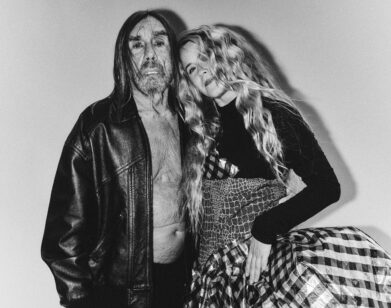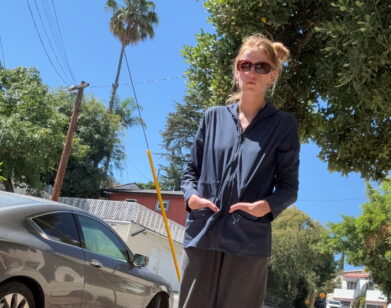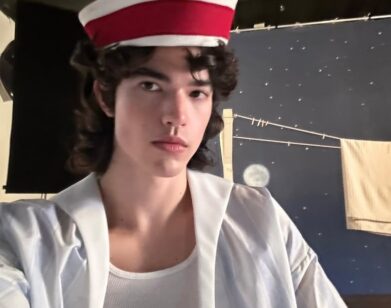Back in La Roux

ABOVE: LA ROUX’S ELLY JACKSON
Best known for her falsetto chops and toe-tapping synth-pop tracks, London-bred artist Elly Jackson is back on the airwaves— and poised to make waves—with sophomore serving, Trouble in Paradise: a nine-track pop-infused follow-up to her self-titled debut album, La Roux. Over five years have passed since fan favorites “Bulletproof” and “In for the Kill” topped charts in the UK, and later, the U.S.
Jackson has certainly endured her ups and downs in the interim. Since her rise to fame in 2009, the self-proclaimed androgynous singer-songwriter has racked up a Grammy for Best Electronic / Dance Album, collaborated with Kanye West on multiple hits, and performed at countless high-profile music festivals, including Coachella, Governor’s Ball, and Osheaga. She’s also suffered through performance anxiety, debilitating voice issues, and split from bandmate, producer, and musical partner, Ben Langmaid.
Despite her trials, Jackson remains committed to perfecting her craft. Allowing her musical inclinations to run free with Trouble in Paradise, La Roux’s long-awaited return also represents a departure from fear—and the result is well worth the wait.
JAMIE LINCOLN: It’s been five years since the release of your debut album, La Roux. Given how successful it was, are you nervous at all about how Trouble in Paradise will be received?
ELLY JACKSON: No, not really. I mean, obviously it’s difficult not to compare one record success-wise, or sales-wise, or whatever, but I think you’re always going to have moments—whatever record you’ve got—of insecurity. I had that on the first record… I didn’t think it was going to do anywhere near as well as it did. I’ve got a normal amount of insecurities. I’m also very much of the mindset that if you’ve made the record you wanted to make and there’s nothing about it that you would change, then you should just be proud and happy with what you’ve done. I’m very, very happy with all the things I’ve managed to represent, and get across on the record that I wanted to, that were in my head, and in my aims and goals. I can only hope that people like it as much as I do, really.
LINCOLN: How do you feel Trouble in Paradise differs sound-wise from La Roux?
JACKSON: To be honest, I feel like the few things that I’ve been told have been written about the tracks that have been released so far is very accurate about how we feel, which is really nice. I don’t read my press, but I’ve certainly been told things that I definitely agree with… like the fact that it’s a lot warmer, it is a lot freer. But I feel that intrinsically, it’s still La Roux—in the essence and the attitude—the feeling of La Roux runs through it. In terms of comparing it to the first record, my only goal was to create a unique energy or attitude, I would say. Something that makes it recognizable. That was obviously really important to me. It still had to sound like the same artist even if it was instrumentally or stylistically totally different. It still had to be obviously me, and I think that’s something that’s there, and runs all the way through it. People have pointed out that it’s quite ambitious, and it does what it wants. I think that’s the main difference. The first record is a little bit more… blocky, if you like. It’s not as free.
LINCOLN: Tell me about your musical process with Trouble in Paradise. How do you start working on an album, and how do you know when it’s “done”?
JACKSON: Oh god, don’t. [laughs] Why do you think it’s taken two years? I mean, you know when it’s not done because you go home and you don’t feel right. We had all these songs for a good year and a half before we handed it in. It’s about making it feel right. Pretty much all of the tracks were complete in terms of structure a long time ago, but getting it to sound like the record we wanted it to sound like was another thing altogether. It’s very difficult the moment it’s finished. When we did finish it, we were kind of expecting this much larger feeling that I had on the first record, but it’s because I had never completed an album before, it kind of just happened. I remember going home on the night of my birthday—and weirdly, we finished this record on my birthday as well, which is very strange—and I did kind of have a big finish, but with this one the finishing process has been quite drawn out. The mixing process took a long time, so it wasn’t as definite. I think it differs from record to record whether you know something’s finished or not, and I’m sure the next record will be completely different.
LINCOLN: You were 21 when you first started to gain widespread praise for “In for the Kill” and later, “Bulletproof.” How do you feel you handled the fame at such a young age?
JACKSON: I think it was different from week to week. Sometimes I thought I understood it and felt like I knew how to handle it, and other times I was completely baffled by the whole concept of it. I was doing what I wanted to do, and that’s kind of the way I saw it… it wasn’t anything else. I don’t think the concept of fame ever really sunk in because I certainly don’t feel it now. I feel exactly the same as all my friends, whom I’ve been friends with since I was a kid. I tried quite hard not to feel it, because I think it kind of ruins you. I think there are some people who have taken on fame in extraordinary ways, like Madonna, David Bowie, and Michael Jackson. There are other people who have taken it on in a completely different way, like Prince—who is just as famous and has achieved just as much—but is still unbelievably mysterious, which I guess Bowie managed to hold as well. There are different ways of dealing with it, and for some people I think it becomes an art form of how you put yourself out there, and for other people it’s literally a way of life, it’s who you are, you act like a celebrity.
LINCOLN: You’re 26 now. How do you think age has affected your songwriting?
JACKSON: A lot. It doesn’t necessarily matter what age I am, but time has passed, and so obviously the context within which I’m writing is different, and therefore the content is different. So I guess learning what I learned through the process of the first record, I think after that I definitely wanted to be more anonymous because I felt like otherwise it would affect the writing process. I think going away and disappearing for a couple of years—or a few years, or whatever—definitely changed the way I look at songwriting. It made me feel more free, it made me feel more like I could just write what I wanted to write about. I wanted to write more observational songs. I think something that happens when you grow a bit older is you become slightly less overly emotional. Obviously when you’re young or a more progressed teenager, you’re overly emotional, so that side of me calmed down. I wanted to write more about stories, and other things that I’d observed and seen or done.
LINCOLN: Two of your songs—namely “Cruel Sexuality,” and “Sexotheque”—make blatant reference to sexuality. Listeners are going to read into these songs what they will, but from your perspective, what are they really about?
JACKSON: “Sexotheque” is just a made up story. It was inspired by a club called Sexotheque in Montreal that we walked past years ago, and my tour manger said, “Sexotheque is such a great name for an album,” and I agreed. The word stuck in my head for a long time after that, and obviously I love disco. Androgyny and all the different ways you can look at sexuality is something that’s very interesting to me, so those kinds of things combined in a word rung through with me. Then I started writing some chords at home and sang a melody, and I just started writing—almost about nothing, whatever words came to my head I wrote down, and then I built a story from that. It started to be about this guy who wanted to mess around, basically, and when I got to the chorus, I thought about the word Sexotheque; and the way to fit it in just came really quickly, and it was a very natural process. It was totally made up, but I think everybody’s seen somebody before that they feel is living their life wrong and is … treating people like shit [laughs], and going about things the wrong way, and usually they’re presenting this kind of extravagant sexual lifestyle but often they’re very unhappy. That’s what Sexotheque is about.
LINCOLN: You’ve collaborated with Kanye West a few times, most recently on Watch the Throne’s “That’s My Bitch” with Jay Z. First off, how did that collaboration come about, and what was it like working with two of the biggest names in rap?
JACKSON: Well, it wasn’t as it seems. Kanye’s manager got in touch with my manager over the course of a few months and asked if I wanted to do something, and we were trying to get “In for the Kill” played on the radio at the time, and basically we felt that maybe … this is something that I’m not into, and I’m not proud of, this kind of promotional technique, but basically we needed a collaborator to get on U.S. radio. Also, I was very pleased to be asked by Kanye West to do something for his record, so it worked out in everyone’s favor, or that’s how it was presented to me. I just spent three days with him, basically, and I didn’t know that one of the tracks I had worked on was going to be on the Jay Z record. I never met Jay Z, and Jay Z wasn’t on the track at the time. It was kind of a weird jumbled-up three days in New York. I sang on, I think in the end it was three, maybe four, tracks, but I don’t think one of them ended up pulling ahead. It was a very strange experience. You know, he … he’s fame in the complete other sense of the word. [laughs] Everybody knows what he’s like, everybody’s seen interviews. I was amazed by the man. It was a very strange experience. I think that’s all I really want to say.
LINCOLN: [laughs] I know as a musician, you’re constantly under the microscope for every little thing you say. I’m interested to hear, where do you feel most at ease?
JACKSON: At home. I’ve lived in the same place since I was born, and I’ve stayed here. It’s where I feel safest. I love it here, and I’ll probably never leave.
LA ROUX’S TROUBLE IN PARADISE IS OUT TOMORROW, JULY 22. FOR MORE ON THE ARTIST, PLEASE VISIT HER WEBSITE.






